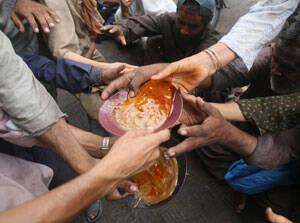The U.N.-sponsored World Summit on Food Security in Rome ended Nov. 18 leaving many participants frustrated with the lack of progress on food security goals. Few high-level representatives from the developed world attended the meeting, and the only G8 head of state at the conference was the host nation’s prime minister, Silvio Berlusconi.
The conference, organized by the U.N. Food and Agriculture Organization, gathered delegates from around the world to identify concrete solutions to end hunger and malnutrition and discuss practical strategies aimed at stabilizing food prices after last year’s disastrous and deadly escalation in basic commodity prices. Many attendees suggested the summit fell far short of achieving such goals. Some food security advocates were hoping the summit would be used to elevate and specify hunger and production goals. Among their specific goals were curtailing first world subsidies, formally committing the U.N. member states to eradicating global hunger completely by 2025 and increasing aid to developing world farmers to $44 billion annually. Instead, vague assurances to “substantially increase” agriculture aid were made, and the draft resolution merely restated the U.N. Millennium Development Goal of halving world hunger by 2015 and called for eradicating hunger “at the earliest possible date.”
Representatives from the Catholic international development agencies Cidse and Caritas Internationalis were particularly critical of the conference outcome. A joint statement on Nov. 16 read: “The World Food Summit has failed to produce a concrete agenda for moving away from business as usual, even as the number of hungry in the world continues to rise.”
Pope Benedict XVI spoke at the summit’s opening. “Hunger is the most cruel and concrete sign of poverty,” he said. “Opulence and waste are no longer acceptable when the tragedy of hunger is assuming ever greater proportions.” The pope called for greater action in creating “a network of economic institutions capable of guaranteeing regular access to sufficient food and water.” He also argued that countries must “oppose those forms of aid that do grave damage to the agricultural sector, those approaches to food production that are geared solely towards consumption and lack a wider perspective, and especially greed, which causes speculation to rear its head even in the marketing of cereals, as if food were to be treated just like any other commodity.”
In an era of climate change uncertainty and population concentrations in the poorest regions of the world, food security advocates say agricultural production must be improved as much as 70 percent by 2050. In addition, the environmental and human impact of existing industrial-modeled agricultural methods must be mitigated or reduced. According to the U.N. Food and Agriculture Organization, more than one billion people are undernourished and one child dies every six seconds because of malnutrition.
Michael O’Brien from Ireland’s Trocaire, a Caritas Internationalis member agency, blamed lack of political leadership “particularly on the part of G8 countries,” for the summit’s lackluster results.
O’Brien is a strong advocate for redirecting institutional and financial resources to small-scale, sustainable farmers as the best means not only of combating hunger but also of improving living standards in the developing world. “Current food, agriculture and trade policies have promoted monocropping and export-oriented production,” he said, “which have led to the reduction of agricultural biodiversity, undermined soil and landscape structures and threatened the use of [ecologically sustainable] practices.” He said, “The experience of countries that have succeeded in reducing hunger and malnutrition shows that economic growth originating in agriculture, in particular the smallholder sector, is at least twice as effective in benefiting the poorest as growth from non-agriculture sectors.”








